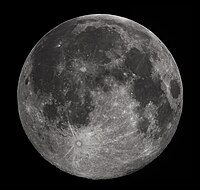
Photo from wikipedia
Abstract Many global catastrophic risks are threatening human civilization, and a number of ideas have been suggested for preventing or surviving them. However, if these interventions fail, society could preserve… Click to show full abstract
Abstract Many global catastrophic risks are threatening human civilization, and a number of ideas have been suggested for preventing or surviving them. However, if these interventions fail, society could preserve information about the human race and human DNA samples in the hopes that the next civilization on Earth will be able to reconstruct Homo sapiens and our culture. This requires information preservation of an order of magnitude of 100 million years, a little-explored topic thus far. It is important that a potential future civilization discovers this information as early as possible, thus a beacon should accompany the message in order to increase visibility. The message should ideally contain information about how humanity was destroyed, perhaps including a continuous recording until the end. This could help the potential future civilization to survive. The best place for long-term data storage is under the surface of the Moon, with the beacon constructed as a complex geometric figure drawn by small craters or trenches around a central point. There are several cost-effective options for sending the message as opportunistic payloads on different planned landers.
Journal Title: Acta Astronautica
Year Published: 2018
Link to full text (if available)
Share on Social Media: Sign Up to like & get
recommendations!